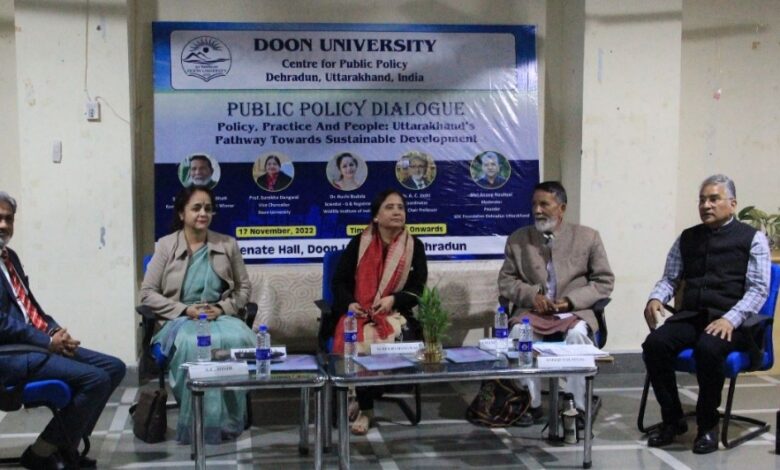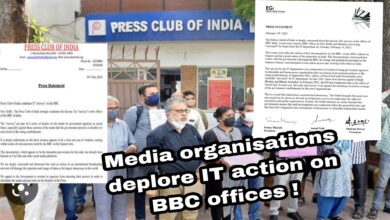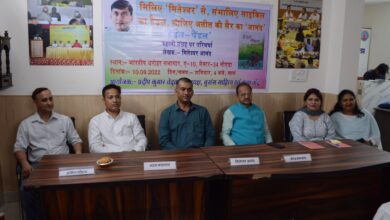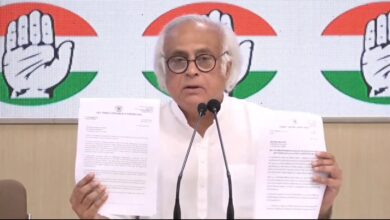Eminent environmentalist Chandi Prasad Bhatt expresses serious concern over deteriorating environment creating ecological disasters !

The Centre for Public Policy, Doon University organised an open Public Policy Dialogue: Policy, Practice and People: Uttarakhand’s Pathway Towards Sustainable Development on 17 November at Senate Hall, to discuss the present alarming environmental concerns and moving towards the path of sustainable development.
The session moderator, Anoop Nautiyal, social worker and founder, Social Development for Communication (SDC) Foundation, Dehradun, Uttarakhand joyously opened the session by interacting with the students.
Mr. Nautiyal shared that climate change is one of the most important concerns in the present times. Also, this dialogue is an attempt to learn from the experience of more than 100 years from our distinguished guest speakers.
He also added that active student participation will add value to this panel discussion, along with the creation and implementation of public policies for mitigating environmental issues in the state.
Ritual forms of communication and cultural practices from the students can help in mitigating disasters in the state. ‘Manels’, a panel with only men is becoming obsolete now.
The session included importance and concerns related to the Himalayas, rivers, mountains, flood, other mitigation efforts, tradition and culture related values associated with the state.
Is there any new perspective we can look at the environmental policies that have been implemented until now was a moot question. Women participation and contribution should be increased emphasised Nautiyal.
The Guest Speaker, Chandi Prasad Bhatt, Ramon Magsaysay Award Winner, Padma Bhushan, Indian Gandhian environmentalist and social activist, founder, Dasholi Gram Swarajya Sangh (DGSS), Gopeshwar, spoke about Uttarakhand’s problems in glaciers, earthquakes, rivers, floods, landslides, ropeways, and other environmental concerns since 50 years. These concerns need collective efforts from all, irrespective of their age, occupation, and economic strata. He also shared that such dialogues and student participation in Doon University is a great initiative and will help in discussing and implementing environment conservation policies.
Trees shouldn’t be cut, the motto in the Chipko movement was also discussed.
People’s power, through the People’s programme is the need of the hour. The environmental degradation issues in the young middle Himalayas are affecting our state’s cultural, political, economic, lifestyle. Three important rivers originate from the Himalayas, Ganga, Brahmaputra, Satluj, which constitute about 33% water basin in India, out of which, the highest percentage approximately, 24% is from the Ganga becomes a major source of water for the country saideminent environmentalist Mr. Bhatt.
Preservation of the two tributaries Paithani and Golaya are also important. He also elaborated the ritual marriage practices along the river banks in the earlier times. We cannot stop the disaster, but our collective and continuous efforts can lessen the effect of such disasters added eminent environmentalist of global fame.
He further emphasised on averting human made disasters saying that the earthquake in Uttarkashi has not just created problems in the district, but the disaster, created major crevices in and around the nearby mountains of Chamoli, Bageshwar, Pithoragarh.
Rumours on the forest percentage needs to checked, so that common people aren’t misinformed he asserted.
Local warming as opposed to the global warming is a major concern he added.
He felt for for Collective human intervention saying that this is the need of the hour adding that the great Himalayas coughs, the entire country shivers leading to havoc therefore our focus need to start from individual miniscule efforts, that will eventually help in the policy formulation and intervention.
Dr. Ruchi Badola, Scientist- G and Registrar, Wildlife Institute of India discussed her experience of meeting Shri Chandi Prasad Bhatt 30 years ago. Uttarakhand’s mountains, rivers, people’s lifestyle, and culture are what we need to save. The policies and interventions should embrace the environmental, social, cultural, political, and economic aspects of the state. There is an increase in floods four times, while droughts increased by two times since 1970. Also, we cannot afford to lose the fight over our rivers for sustainability. We will need to question ourselves, if we need economic development, environmental preservation, convert our marriage traditions as per the new fashion. We need to start looking at our Himalayan strength, rather than our weaknesses.
Well-being amongst the rural population near the forest areas, due to food security. Women of a family have been the treasurer of house ration, and nobody went into food shortage by maintaining local food production and consumption, earlier before the cash crop cultivation become prevalent.
Water was secured as the river started from a temple in the forest. Medicinal security due to natural remedies have always been correct, in accordance to their consumption, cultivation, and preservation. The future is in water, and trees and therefore, ‘pedho pe hi paisa lagega’. Uttarakhand has 17 protected areas, with abundant marine, and around 10 animal population.
We should move towards nature-based tourism instead of destination wedding tourism, the state needs to promote local low value yet high value tourism. Dynamic community participation and their development is the need of the hour, by honing individuals of their strengths and exposure.
And it is a never- ending, context specific as every district, every village needs to be taken into account. Lessons from our local culture through food, rituals, livelihoods, are becoming solutions to our environmental issues.
The Honourable Vice-Chancellor Prof. Surekha Dangwal, Patron shared that this collaboration between academics and experienced people from the grassroots and their activities for environment preservation is the most important.
Human virtues like self-reliance cannot be taught in schools and colleges but come with an individual contribution. We are the trustees of the future economy. One cannot hold land on this earth, but a continuous collective and individual contribution toward nature conservation are what we need to discuss. Villages and their inhabitants are rich due to the Yamuna valley, and their cultivation practices, and also they strive to make their lands rich with their contribution towards nature.
Prof. Dangwal also shared about Dehradun being the smartest city earlier, and now with unnecessary industrial interventions are we trying to re-vamp the city as smart city, as if the city will wear coat and tie. ‘Jungle humara maika hai’ from the Chipko movement became an important phrase throughout the world. Also, we have brought music systems in our marriages, which weren’t traditions. Recasting and relocating of our villages have led to a change in the state’s architecture.
Environment conservation can be learnt from traditional practices. Unless rural population isn’t included in policy making, governmental interventions will go waste.
Employment to girls from the mountains, will help such girls marry people from their community, keeping culture and traditions of the Uttarakhand mountains alive. Constant women participation and contribution is a major move towards environmental preservation.
Youth needs to understand the traditional practices, learn from the grassroots, and not just Google. Unless local people, especially women, are made economically viable, environmental conservation will be difficult. Westernised cultures are now moving towards our cultural traditions, even with meagre and alternate resources.
We will work towards starting small, by banning the Single-use plastic in the university campus.
Dr. A.C. Joshi, Coordinator, NTPC Chair Professor shared that the state of Uttarakhand is highly susceptible to both natural and manmade disasters. Dr. Joshi also shared that the next Public Policy Dialogue session is scheduled on 22 December on tourism policy.
Prof. H.C. Purohit, Dean, Student Welfare and Head of Department, School of Management gave the Vote of Thanks. Prof. Purohit also shared that we are pleased to have Uttarakhand’s nature man, Shri Chandi Prasad Bhatt ji amongst us, and highlighted articles 41 and 42 in the Indian Constitution speaks about the spiritual and nature bounty of our nation. The University is striving hard to provide training to all the students for people’s welfare through environment sensitivity, and other related programmes.
The students participated in the question hour with much enthusiasm and suggested that the University becomes an icon in the area for undertaking ‘Ban of single-use plastic’. The session was attended by distinguished experts, faculty members, students, and research scholars.






